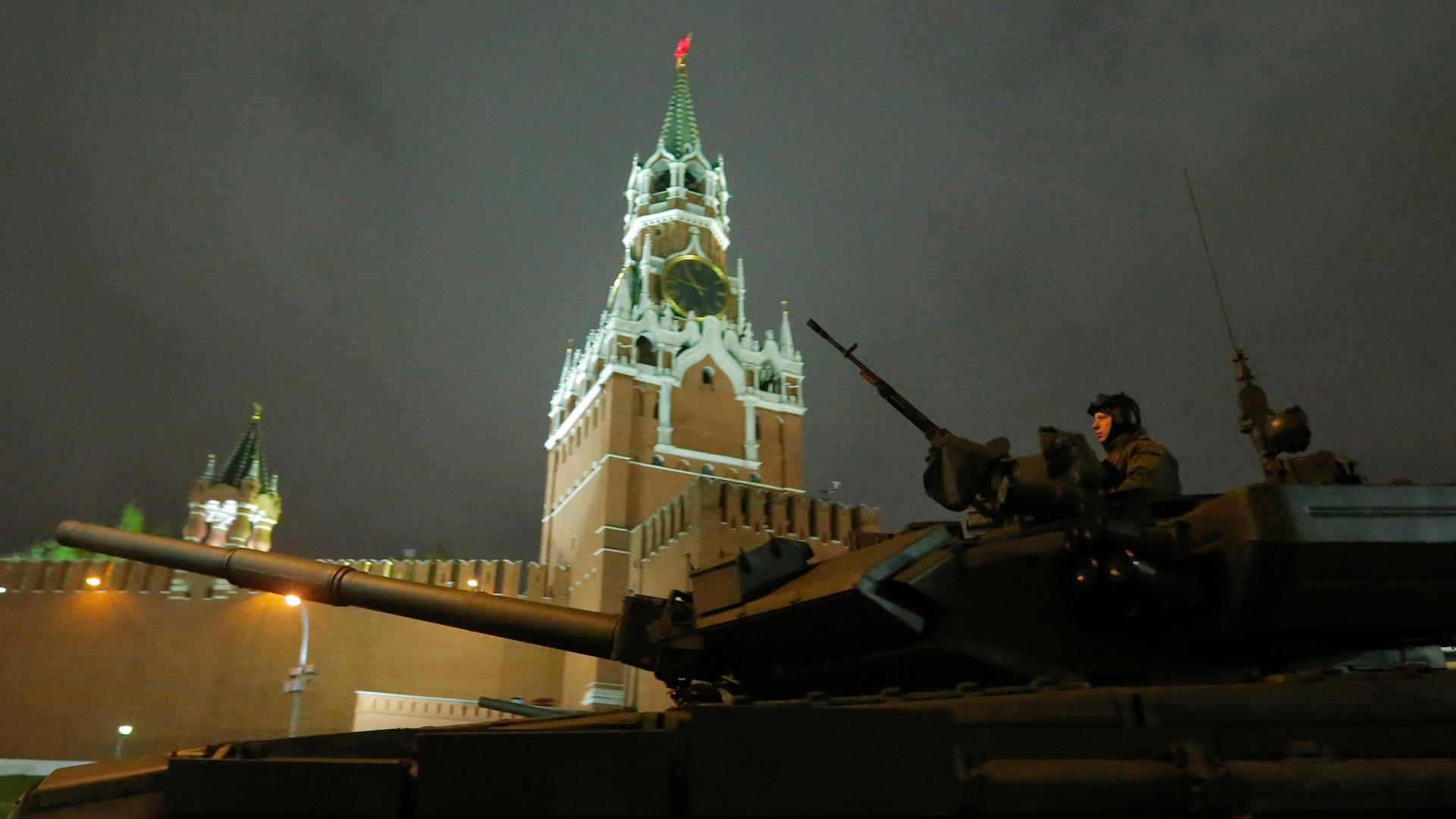An American faces a bewildering end to her decade in Russia
A Russian tank drives past the Kremlin during a rehearsal for the Victory parade on Moscow’s Red Square on May 5, 2014.
With tension building rapidly between the United States and Russia, St. Petersburg is a difficult place to live as an American right now — even more so if you're working for the rights of Russians while the Kremlin cracks down on activists and NGOs. So, basically, it's tough to be Jennifer Gaspar.
On August 8, after 10 years of living Russia, Gaspar received a letter labelling her a national security threat. She was ordered to leave the country.
Gaspar is an independent consultant for various NGOs. Her husband, Ivan Pavlov, is a prominent Russian human rights lawyer. But what did Gaspar do in particular to make her a target of the Russian government?
“That’s a question we’ve been asking ourselves quite a bit,” Gaspar says from her home in St. Petersburg. “But, quite honestly, it’s hard for me to fathom how the work I’ve been doing in trying to help organizations become better managed — become more open and accountable to the public and to their donors — how that would constitute a threat to Russia’s national security.”
Her NGO work spans a wide range of organizations from art museums to legal advocacy groups. Some of the groups she works with, however, have been labelled “foreign agents" by the Russian government. All that classification definitively means is that a group is a non-profit that receives foreign funding.
“I think it’s like … an ‘ideal storm,’ when all circumstances happen in one place at the same time,” Pavlov says. “Jennifer has American citizenship. I am human rights lawyer with 20 years' practice in Russia and took part in high-profile cases here. It’s like to put a Star of David on an armband.”
Pavlov founded the Institute for Information Freedom Development, a private group that advocates for government transparency. While both Pavlov and Gaspar fundamentally oppose the measure taken against them, they still plan to follow procedure. “It’s quite serious and it has to be observed,” Gaspar says. “I have to leave or I have to appeal through the court system.”
Either that, or Russian authorities could throw her in jail. “Or escort me to the nearest airport," she says. "I’m not quite sure what the process is and I hope not to find out.”
According to the couple, they have already appealed to the court. They expect a decision sometime next week. For now, Gaspar's status remains unclear.
To Gaspar and Pavlov, the matter is personal — they have a 5-year-old daughter together, who was born a Russian citizen. For them, keeping their family together through all of this is the ultimate goal. “It’s not a question," Gaspar says. "The idea of being separated from my family with such an absurd accusation — there’s just no other choice but to fight this.”
With tension building rapidly between the United States and Russia, St. Petersburg is a difficult place to live as an American right now — even more so if you're working for the rights of Russians while the Kremlin cracks down on activists and NGOs. So, basically, it's tough to be Jennifer Gaspar.
On August 8, after 10 years of living Russia, Gaspar received a letter labelling her a national security threat. She was ordered to leave the country.
Gaspar is an independent consultant for various NGOs. Her husband, Ivan Pavlov, is a prominent Russian human rights lawyer. But what did Gaspar do in particular to make her a target of the Russian government?
“That’s a question we’ve been asking ourselves quite a bit,” Gaspar says from her home in St. Petersburg. “But, quite honestly, it’s hard for me to fathom how the work I’ve been doing in trying to help organizations become better managed — become more open and accountable to the public and to their donors — how that would constitute a threat to Russia’s national security.”
Her NGO work spans a wide range of organizations from art museums to legal advocacy groups. Some of the groups she works with, however, have been labelled “foreign agents" by the Russian government. All that classification definitively means is that a group is a non-profit that receives foreign funding.
“I think it’s like … an ‘ideal storm,’ when all circumstances happen in one place at the same time,” Pavlov says. “Jennifer has American citizenship. I am human rights lawyer with 20 years' practice in Russia and took part in high-profile cases here. It’s like to put a Star of David on an armband.”
Pavlov founded the Institute for Information Freedom Development, a private group that advocates for government transparency. While both Pavlov and Gaspar fundamentally oppose the measure taken against them, they still plan to follow procedure. “It’s quite serious and it has to be observed,” Gaspar says. “I have to leave or I have to appeal through the court system.”
Either that, or Russian authorities could throw her in jail. “Or escort me to the nearest airport," she says. "I’m not quite sure what the process is and I hope not to find out.”
According to the couple, they have already appealed to the court. They expect a decision sometime next week. For now, Gaspar's status remains unclear.
To Gaspar and Pavlov, the matter is personal — they have a 5-year-old daughter together, who was born a Russian citizen. For them, keeping their family together through all of this is the ultimate goal. “It’s not a question," Gaspar says. "The idea of being separated from my family with such an absurd accusation — there’s just no other choice but to fight this.”
